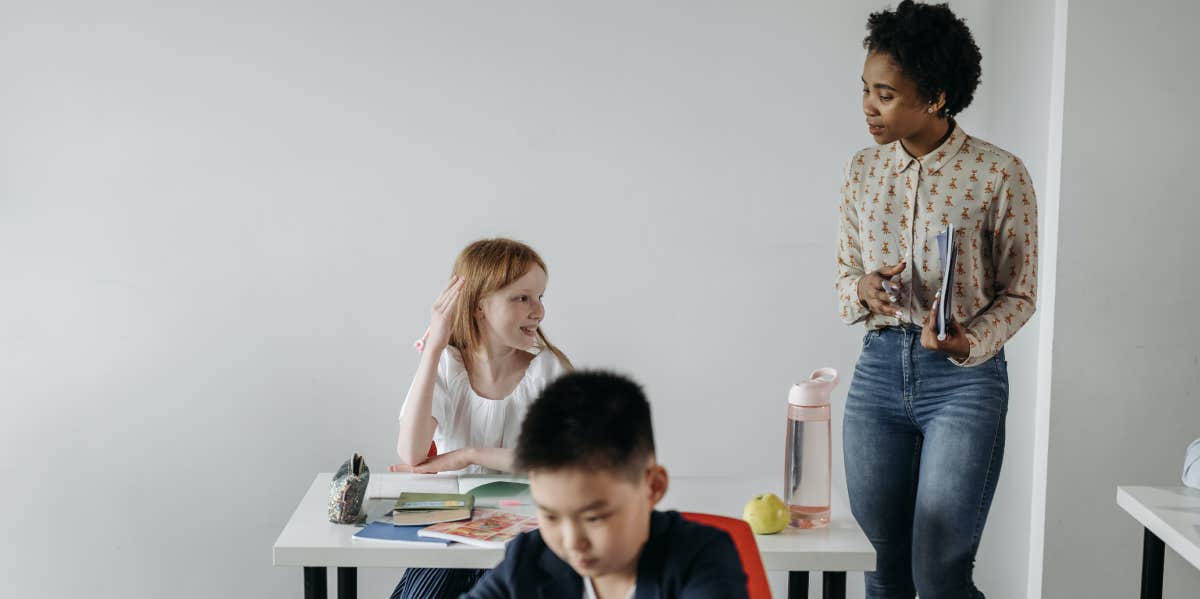Parents Rally Around Teacher Who Had To Pay For Her Own Substitute While Battling Cancer
A feel-good moment that highlights the unfair reality for teachers in the public school system.
 Pavel Danilyuk / Pexels
Pavel Danilyuk / Pexels A teacher has been offered support by parents after it was revealed that she would be required to fund her own substitute teacher while battling an illness.
In 2019, a second-grade teacher at Glen Park Elementary School in San Francisco was scheduled to be out for the remainder of the school year after being diagnosed with breast cancer, but according to state law, she was required to make accommodations on her own for a replacement teacher.
Parents rallied around a teacher who had to pay for her own substitute teacher while battling cancer.
According to the San Francisco Chronicle, the teacher, who has chosen to remain anonymous, was diagnosed with breast cancer, and while she was on medical leave, she had to pay for her own substitute teacher while battling the deadly illness.
The parents at the elementary school were shocked to learn that since the teacher had used up all of her sick days and was now using her extended leave time, her pay was being docked $195 each day to afford a replacement teacher.
RELATED: Teacher Makes Students Address Themselves In A Mirror Before Class 'To Start Their Day Off Right'
“Parents were outraged and incredulous — like, this can’t be,” Amanda Fried, whose daughter attends the school, told the Chronicle. “There must be some mistake.”
The incident stems from a policy created in the 1970s, which states teachers who go on leave for injury or illness for five months have the cost of a substitute pulled from their paychecks. Because teachers in the state don’t pay into California’s disability insurance program, they cannot access its benefits, according to the Chronicle.
Per KQED, substitute teachers cost an average of $203.16 per day ― which means most teachers on extended sick leave in the district will only get about half of their daily pay.
The teacher, who had exhausted all of her sick days, was forced to use the Catastrophic Sick Leave Bank, which allows other teachers in the same district to donate their sick days to colleagues who are in need.
This incident highlights a deeper issue that targets teachers in the public school system, who are already left without many of the essential resources they need to do their jobs, including the amount of money they make from their salaries.
In the United States, only 21% of the civilian workforce has paid leave. In states, cities, and counties that do not have paid leave laws and ban collective bargaining, teachers have to rely on individual school districts to provide the benefit contractually. For them, paid leave is not guaranteed.
Parents at the elementary school decided to raise money for the teacher.
In response to the California Education Code, parents of students at the elementary school decided to start a GoFundMe to raise money for the teacher.
The campaign raised over $13,000 in 14 days, surpassing its initial goal of $10,000. The page is no longer accepting donations.
"I just feel sad that from what I heard, she is a very good teacher and I just feel sad what's going on to her," Narciso Flores-Diaz, a parent, told NBC Bay Area. "Our school is pulling together to help her and to make her feel that she’s not alone."
The teacher, who worked at the school for 17 years deserved community support because "she has nurtured our children and now it is time for us to take care of her," according to the campaign, via The Chronicle.
"Her dedication and love for her students" can’t be ignored, the post continued.
"Just a few days after her surgery, she took the time to write out 22 completely personalized notes to the students in the class thanking them for their support, telling them she missed them dearly and encouraging them to continue working hard."
Eric Heins, president of the California Teachers Association, told The Washington Post that despite the positive outcome, a teacher shouldn't have to depend on a GoFundMe page to make sure she is being paid adequately.
"What it really is, is a reflection of how financially strapped the system has been for so long,” Heins said.
“It is outrageous when you think about someone suffering from a catastrophic illness that they actually have to deal with these kinds of issues while already facing extra financial pressure.”
Nia Tipton is a writer living in Brooklyn. She covers pop culture, social justice issues, and trending topics.
